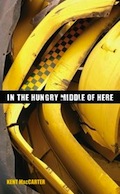 In the Hungry Middle of Here by Kent MacCarter
In the Hungry Middle of Here by Kent MacCarter
Transit Lounge Publishing, 2009
The three sections of Kent MacCarter's excellent debut collection are marked by recipes of an imaginative kind. In 'Fruit Salad with Papaya-Mint Sauce' he instructs the reader to include 'Ounces of fresh goddamn seedless everything', which serves as an apt description of the collection as a whole. MacCarter's poetry is a sort of mulligan stew that seamlessly blends landscape, as Japan, New Zealand, Australia and various locales in the United States coagulate into a coherent vision.
Consider 'Recurrence' where North Fitzroy elides with Venice:
in queue inside Piedemonte's Grocery
Cherry Ripes and Freddo Frogs cause rapids
In the front of me
A woman
poles a
gondola
But although he takes us to places such as Melaka and Cat Ba Town, MacCarter's poetry never resorts to the easy discourse of exoticism. Or rather, it is the everyday that becomes exotic, filtered through the perceptions of the poet, which renders Melbourne as estranged as any of the collection's other diverse locations. In 'At Night, Tram #1/22, Lygon St.', the wires that guide Melbourne's trams metamorphose into a dividing line for the night sky:
The catenary wire maps
a recipe, a direction, a quartering up
of drawn sky. Incisions in dark
tins of fudge
Here, as elsewhere, MacCarter's deft use of enjambment creates the appropriate tension for his transformations of the commonplace. But, in this example, we can also see the second level on which his 'recipes' operate, since in MacCarter's vision landscape becomes something to be savoured and digested. In his poems, the hunger for landscape (as the title of the collection suggests) becomes a literal desire, and Lorne's backstreets are served up as a 'pasta of driveways'.
Thankfully, this merging of land and food isn't programmatic, allowing the correspondences that MacCarter develops to remain fresh and intriguing over the length of the collection. Another great strength of MacCarter's work is that his metamorphoses, however unexpected, always remain specific to their object. As William Carlos Williams said in Kora in Hell (1920), 'the coining of similes is a pastime of very low order, depending as it does upon a nearly vegetable coincidence. Much more keen is the power which discovers in things those inimitable particles of dissimilarity to all other things'. MacCarter's work successfully exploits difference and specificity even in his linguistic choices, as he mixes phrases from his American homeland ('Deb parties') with adopted Australianisms ('yonks'). Nowhere is this specificity more apparent than in 'I Found the Six of Spades in Cat Ba Town':
Not just any six
of spades, the six of spades. Mine. Somebody's
millennia-ago ensured I'd find it. Here
these smoggy waves from Haiphon
ship a fragrant peekaboo to my nose
Here the specificity of both objects and locations are primary; this is not a six of spades, but the six of spades, and the waves from Haiphon seem to carry a breeze particularly destined for the speaker's own nostrils. The mood might recall something like Wallace Steven's 'Anecdote of the Jar', and, similarly to that poem, MacCarter's own poetry is a modern reworking of the pastoral; his pastoral vision is inseparable from the consciousness that perceives it, and the dividing line between perceiver and landscape disappears. This process becomes apparent in a poem like 'Possibilities of Being Aged 9 in a Polson, Montana Dimestore', which offers a seeming laundry list of items in the store from the perspective of a nine-year-old child:
Cross stitch Chem ist
Saw dust Sham poo
Peli can Fan fare
Card board Over lord
This list's unusual typography doesn't strain the reader thanks to the linguistic playfulness brought into the poem. This serves as another of the collection's great strengths. At any point where the thematics of his work threaten to become overburdening, they are leavened by a wry sense of humour. It's rare to read a book of poems that is actually funny, and rarer still for such poems to not feel like a bad set-up for a one-liner. MacCarter's jokes are both funny and in keeping with his imaginative transformations of the real, as we see in 'Rez':
Near Browning, out where the prairie falters
Wild grains shy away from jagged granite combs
Like hairlines of elders stressed
From utility bills
Ultimately, In the Hungry Middle of Here is an exceptionally strong debut collection from a very good poet; the linguistic and thematic detail reward rereading, making it a collection the reader will want to return to. But most importantly, MacCarter's language exudes playfulness and sheer joy, making it a genuine pleasure to read.
Emmett Stinson is Fiction Editor at Wet Ink.









